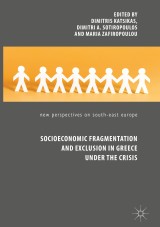Details

Socioeconomic Fragmentation and Exclusion in Greece under the Crisis
New Perspectives on South-East Europe
|
96,29 € |
|
| Verlag: | Palgrave Macmillan |
| Format: | |
| Veröffentl.: | 02.03.2018 |
| ISBN/EAN: | 9783319687988 |
| Sprache: | englisch |
Dieses eBook enthält ein Wasserzeichen.
Beschreibungen
This volume uses new empirical evidence and analytical ideas to study phenomena of fragmentation and exclusion threatening stability and cohesion in Greek society in the aftermath of the crisis. The contributors argue that processes of fragmentation and exclusion provoked by the crisis can be observed on both a material and an ideational level. On a material level, rising levels of unemployment, poverty and inequality have produced new social security “outsiders”, while on an ideational level, a discursive-cultural shift is documented, which has led to new understandings and categorizations of new (and old) insiders and outsiders. Moreover, the volume attests to the aspirations, but also the limitations, of spontaneous civil society mobilization to address the social crisis. Finally, the volume offers a discussion of the political management of social fragmentation and exclusion in Greece both before and after the onset of the crisis. The book will be of interest to scholars and students of social policy and phenomena of poverty, social exclusion and economic inequality, civil society studies, and comparative political economy and politics.<p></p><p></p>
1. Introduction; D. Katsikas.- 2. Inequality, poverty and social exclusion in Greece before and after the crisis; D. Katsikas, A. Karakitsios, K. Filinis and A. Petralias.- 3. Labour market developments in Greece before and after the crisis; K. Filinis and A. Karakitsios.- 4. The Double Mismatch: Anti-poverty policies and discourses on poverty and social exclusion in Greece before and after the onset of the economic crisis; D. A. Sotiropoulos.- 5. Public discourse of poverty and social exclusion before and after the crisis: An analysis of official documents and media articles; A. Papakonstantinou and D. Katsikas.- 6. Perceptions of poverty and social exclusion during the crisis: The view of policy and opinion makers; D. A. Sotiropoulos and A. Papakonstantinou.- 7. Civil society discourses on poverty and social exclusion under the Greek crisis; A. Theodosiou and M. Zafeiropoulou.- 8. Understanding civil society’s policies before and during the crisis; M. Zafiropoulou.- 9. Exploring civil society’s resilience strategies during the crisis; M. Zafeiropoulou and A. Theodosiou.- 10. The rebirth of civil society in Greece under the crisis?; D. A. Sotiropoulos.- 11. Conclusions; D. A. Sotiropoulos.
<p>Dimitris Katsikas is Lecturer of International and European Political Economy at the National and Kapodistrian University of Athens and Head of the Crisis Observatory at the Hellenic Foundation for European and Foreign Policy (ELIAMEP), Greece. </p><p> </p><p>Dimitri A. Sotiropoulos is Associate Professor of Political Science at the National and Kapodistrian University of Athens, Greece. He has published six books on Greek politics and society in Greek.</p><p> </p><p> </p><p>Maria Zafiropoulou works as an expert for the E.U. in healthcare and social issues and she is an active member of the Crisis Observatory at the Hellenic Foundation for European and Foreign Policy (ELIAMEP), Greece.</p>
This volume uses new empirical evidence and analytical ideas to study phenomena of fragmentation and exclusion threatening stability and cohesion in Greek society in the aftermath of the crisis. The contributors argue that processes of fragmentation and exclusion provoked by the crisis can be observed on both a material and an ideational level. On a material level, rising levels of unemployment, poverty and inequality have produced new social security “outsiders”, while on an ideational level, a discursive-cultural shift is documented, which has led to new understandings and categorizations of new (and old) insiders and outsiders. Moreover, the volume attests to the aspirations, but also the limitations, of spontaneous civil society mobilization to address the social crisis. Finally, the volume offers a discussion of the political management of social fragmentation and exclusion in Greece both before and after the onset of the crisis. The book will be of interest to scholars and students of social policy and phenomena of poverty, social exclusion and economic inequality, civil society studies, and comparative political economy and politics.<p></p>
Tackles the crisis and the related growing debate on economic inequalities, the rise of Euroscepticism and the change of the political landscape Engages with timely issues of European fragmentation, which relate to public debates on the EU Leads to considerations on the scope, structure and reform of the “European” welfare state, particularly in Southern Europe
Tackles the crisis and the related growing debate on economic inequalities, the rise of Euroscepticism and the change of the political landscape <div><br/></div><div>Engages with timely issues of European fragmentation, which relate to public debates on the EU </div><div><br/></div><div>Leads to considerations on the scope, structure and reform of the “European” welfare state, particularly in Southern Europe<div><div><br/></div></div></div>

















